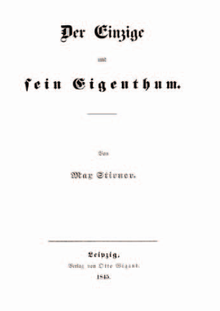
The Ego and Its Own (German: Der Einzige und sein Eigentum), also known as The Unique and Its Property[1][2][3] is an 1844 work by German philosopher Max Stirner. It presents a post-Hegelian critique of Christianity and traditional morality on one hand; and on the other, humanism, utilitarianism, liberalism, and much of the then-burgeoning socialist movement, advocating instead an amoral (although importantly not inherently immoral or antisocial) egoism. It is considered a major influence on the development of anarchism, existentialism, nihilism, and postmodernism.[4][5]
In 2010, John F. Welsh coined the term dialectical egoism for the thoughts of Stirner expressed in this work, in order to emphasize the distinction from the negative and pejorative connotations from the common everyday use of egoism in the sense of egotism.
The discussion which follows is based on the English translation by Steven T. Byington, first published in 1907.[6] A more recent translation by Apio Ludd aka Wolfi Landstreicher was published by Underworld Amusements in 2017 under the title The Unique and Its Property, the translator noting that Stirner had not used the word ego.[7]
- ^ Blumenfeld, Jacob (2018). All Things Are Nothing To Me (1st ed.). Zero Books. p. 17. ISBN 9781785358951.
- ^ Swain, Dan; Urban, Petr; Malabou, Catherine; Kouba, Petr (2021). Unchaining Solidarity: On Mutual Aid and Anarchism with Catherine Malabou (1st ed.). Rowman & Littlefield International. pp. 83–103. ISBN 9781538157954.
- ^ Landstreicher, Wolfi (2022). The Unique and Its Property (2nd ed.). Underworld Amusements. ISBN 978-1365308864.
- ^ Leopold, David (2006-08-04). "Max Stirner". In Zalta, Edward N. (ed.). Stanford Encyclopedia of Philosophy.
- ^ Goodway, David. Anarchist Seeds Beneath the Snow. Liverpool University Press, 2006, p. 99.
- ^ Cite error: The named reference
TheEgoAndItsOwnwas invoked but never defined (see the help page). - ^ Stirner, Max (1844). Apio Ludd aka Wolfi Landstreicher (ed.). The Unique and Its Property. Baltimore: Underworld Amusements. p. 8. ISBN 978-1-943687-90-9. Retrieved 12 September 2023.